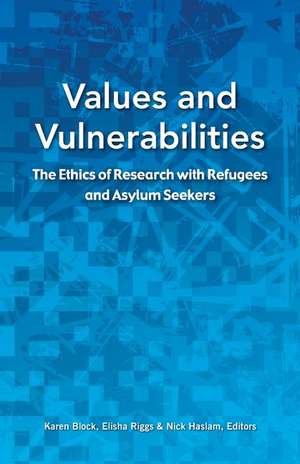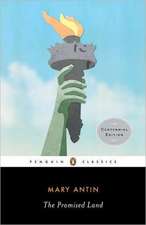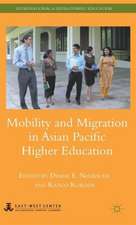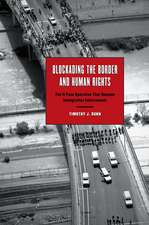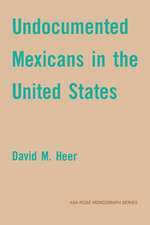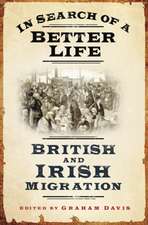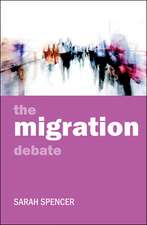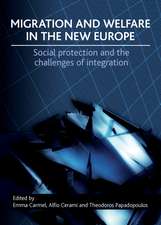Values and Vulnerabilities: The Ethics of Research with Refugees and Asylum Seekers
Editat de Karen Block, Elisha Riggs, Nick Haslamen Limba Engleză Paperback – 20 iun 2013
Preț: 295.96 lei
Nou
Puncte Express: 444
Preț estimativ în valută:
56.64€ • 58.68$ • 47.27£
56.64€ • 58.68$ • 47.27£
Carte tipărită la comandă
Livrare economică 21 martie-04 aprilie
Preluare comenzi: 021 569.72.76
Specificații
ISBN-13: 9781922117137
ISBN-10: 1922117137
Pagini: 240
Dimensiuni: 140 x 216 x 13 mm
Greutate: 0.29 kg
Editura: Australian Academic Press
ISBN-10: 1922117137
Pagini: 240
Dimensiuni: 140 x 216 x 13 mm
Greutate: 0.29 kg
Editura: Australian Academic Press
Recenzii
Thinking through the ethical issues of refugee research clears the way to producing knowledge that can guide humane policy that respects the need for asylum. In so doing, we have the opportunity to advance the vision of human community and solidarity inherent in human rights. Ultimately, our capacity to provide refuge says much about the moral quality or climate of our communities — as our humanity is tested by our response to the strangers at the gate. - Laurence J. Kirmayer, James McGill Professor and Director, Division of Social and Transcultural Psychiatry, Department of Psychiatry, McGill University.
Extras
We live in a time when the numbers of people forced to flee for their lives by violence and adversity is greater than ever — yet the proportion granted asylum as refugees has declined. While there have been heated debates in wealthy countries about how to honour humanitarian goals and international commitments for asylum, most of those forced to migrate are internally displaced people struggling to survive in regions of impoverished, war-torn countries that can afford them little protection. Many who would avail themselves of refugee status are unable to find any safe haven and continue to be exposed to violence, privation and profound uncertainty about their fate.
The category of refugees is not intrinsic to any individual’s personhood or identity. Refugees are forcibly made by the actions of others: first by the violence that propels them from their homes, then by the international conventions that define the category of refugee and finally, by the immigration policies of countries that provide asylum. The 1951 UN Convention Relating to the Status of Refugees recognised the right of individuals facing persecution by reason of race, religion, nationality, membership of a particular social group or political opinion to seek asylum and the obligation of nations to provide this safe haven. Refugee rights represent an important step in building a global community founded on respect for human life and on basic notions of equity, equality, and responsibility.
Serious engagement with the predicament of refugees comes from an ethical position of universalism, based on the thought experiment of substitution — what if it was me or my family in that situation? In making this shift in perspective, we are limited by our imagination and by our willingness to recognise that our positions of privilege are not earned but accidental. Our safety, power and privilege are accidents of history and geography, outcomes of an implicit ‘birthright lottery’ that has resulted in our relative advantage. For those of us who live in wealthy and peaceful countries, it is tempting to view our good fortune as due to our own virtue or the wise choices and hard work of our ancestors. In this way, our privilege is justified and the sense of a just moral order is maintained. Unfortunately, the evidence is everywhere at hand that resources have not been evenly distributed on the basis of need, merit or any notion of justice. The world is a manifestly unfair place with inhumane inequities reflecting the historical violence of colonisation, racism, war and exploitation. Indeed, it is not hard to show that much of our relative advantage stems directly from enduring forms of structural violence root in this violent history. Globalisation, as much as it increases the mobility of information and opportunity, acts in many ways to exacerbate these inequalities.
Recognising this history should motivate us all to shelter those most acutely in need. Yet, the current climate of fear and suspicion has challenged and in some places actively undermined our modest steps toward respecting human rights and equity. The current plight of refugees reflects a global regime of insecurity that increasingly views strangers as potential vectors of terror and disruption, threats to a secular social order, or, at best, as a burdensome drain on resources.
The contributors to this volume have thought long and hard about the dilemmas posed by the refugee’s predicament and seek ways to use research to understand the impact of human rights, law and governmental practices, to chart the trajectories of survival and resilience and discover ways to mitigate the impact of policies of deterrence, exclusion and harsh treatment that abound. As the editors note, three central themes run throughout the book: vulnerability, both as risk for illness but also as a call to ethical action and responsibility; power, both political and professional; and the relationship between research and advocacy which calls for active efforts by professionals and others to make common cause and support agency of people who have lost their homes.
The category of refugees is not intrinsic to any individual’s personhood or identity. Refugees are forcibly made by the actions of others: first by the violence that propels them from their homes, then by the international conventions that define the category of refugee and finally, by the immigration policies of countries that provide asylum. The 1951 UN Convention Relating to the Status of Refugees recognised the right of individuals facing persecution by reason of race, religion, nationality, membership of a particular social group or political opinion to seek asylum and the obligation of nations to provide this safe haven. Refugee rights represent an important step in building a global community founded on respect for human life and on basic notions of equity, equality, and responsibility.
Serious engagement with the predicament of refugees comes from an ethical position of universalism, based on the thought experiment of substitution — what if it was me or my family in that situation? In making this shift in perspective, we are limited by our imagination and by our willingness to recognise that our positions of privilege are not earned but accidental. Our safety, power and privilege are accidents of history and geography, outcomes of an implicit ‘birthright lottery’ that has resulted in our relative advantage. For those of us who live in wealthy and peaceful countries, it is tempting to view our good fortune as due to our own virtue or the wise choices and hard work of our ancestors. In this way, our privilege is justified and the sense of a just moral order is maintained. Unfortunately, the evidence is everywhere at hand that resources have not been evenly distributed on the basis of need, merit or any notion of justice. The world is a manifestly unfair place with inhumane inequities reflecting the historical violence of colonisation, racism, war and exploitation. Indeed, it is not hard to show that much of our relative advantage stems directly from enduring forms of structural violence root in this violent history. Globalisation, as much as it increases the mobility of information and opportunity, acts in many ways to exacerbate these inequalities.
Recognising this history should motivate us all to shelter those most acutely in need. Yet, the current climate of fear and suspicion has challenged and in some places actively undermined our modest steps toward respecting human rights and equity. The current plight of refugees reflects a global regime of insecurity that increasingly views strangers as potential vectors of terror and disruption, threats to a secular social order, or, at best, as a burdensome drain on resources.
The contributors to this volume have thought long and hard about the dilemmas posed by the refugee’s predicament and seek ways to use research to understand the impact of human rights, law and governmental practices, to chart the trajectories of survival and resilience and discover ways to mitigate the impact of policies of deterrence, exclusion and harsh treatment that abound. As the editors note, three central themes run throughout the book: vulnerability, both as risk for illness but also as a call to ethical action and responsibility; power, both political and professional; and the relationship between research and advocacy which calls for active efforts by professionals and others to make common cause and support agency of people who have lost their homes.
Textul de pe ultima copertă
Forced migration is a global issue.
About 34 million of the world’s inhabitants were identified in 2010 by the United Nations High Commissioner for Refugees as either refugees, internally displaced persons, asylum seekers or stateless people. Systematic inquiries are urgently needed to understand and improve the circumstances in which these people live, and to guide national and international policies and programs.
However, there are many ethical complications in conducting research with uprooted people, who have often been exposed to persecution and marginalisation in conflict situations, refugee camps, immigration detention settings, and following resettlement. This book brings together for the first time key scholars across a range of disciplines including anthropology, bioethics, public health, criminology, psychology, socio-linguistics, philosophy, psychiatry, social policy and social work to discuss the ethical dimensions, challenges and tensions of such research.
It encompasses the theoretical, conceptual, practical, and applied aspects of research ethics, while integrating different disciplinary perspectives. It is intended as a resource not only for researchers, students and practitioners but also for those conducting cross-cultural research more broadly. Many of its arguments, examples and concerns are pertinent to research with other vulnerable or marginalised populations.
About 34 million of the world’s inhabitants were identified in 2010 by the United Nations High Commissioner for Refugees as either refugees, internally displaced persons, asylum seekers or stateless people. Systematic inquiries are urgently needed to understand and improve the circumstances in which these people live, and to guide national and international policies and programs.
However, there are many ethical complications in conducting research with uprooted people, who have often been exposed to persecution and marginalisation in conflict situations, refugee camps, immigration detention settings, and following resettlement. This book brings together for the first time key scholars across a range of disciplines including anthropology, bioethics, public health, criminology, psychology, socio-linguistics, philosophy, psychiatry, social policy and social work to discuss the ethical dimensions, challenges and tensions of such research.
It encompasses the theoretical, conceptual, practical, and applied aspects of research ethics, while integrating different disciplinary perspectives. It is intended as a resource not only for researchers, students and practitioners but also for those conducting cross-cultural research more broadly. Many of its arguments, examples and concerns are pertinent to research with other vulnerable or marginalised populations.
